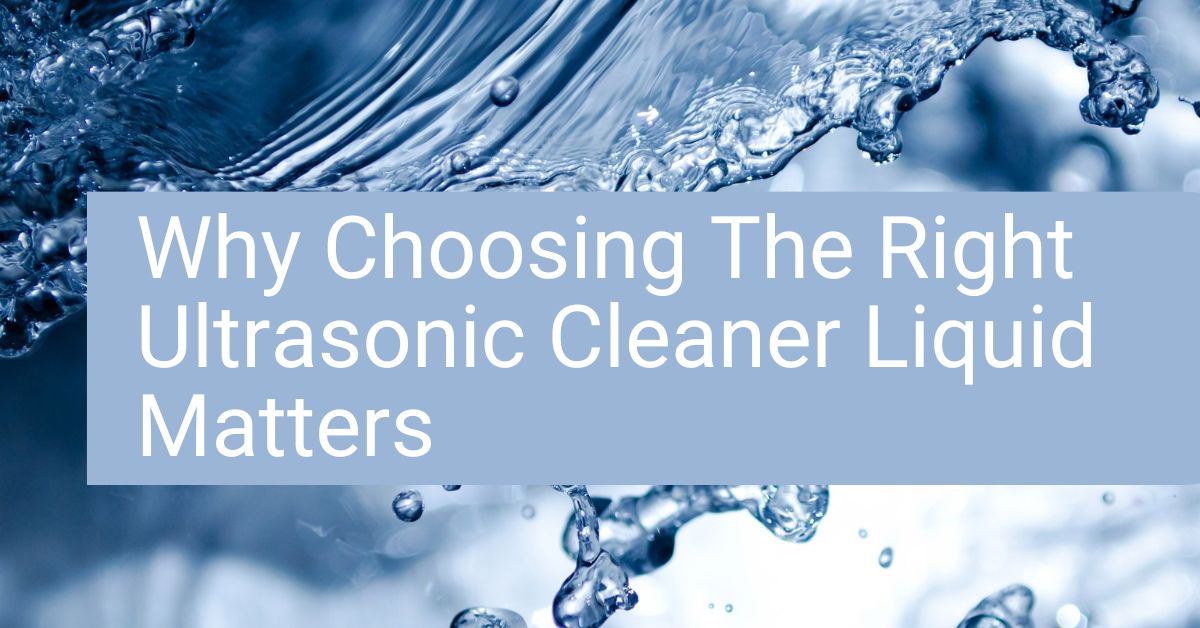Why Choosing The Right Ultrasonic Cleaner Liquid Matters

Choosing the right ultrasonic cleaner solution for your product is essential to get the right precision cleaning needs met. The best way to start is by analyzing what you are cleaning, the material it’s composed of, and the substance you’re removing from it.
Ultrasonic technology can clean a wide range of objects from medical equipment and dental instruments to industrial parts, but different solutions are better formulated for items made of varying materials. Furthermore, specific cleaners are more suited to the task of removing particular substances such as oil, grease, waxy compounds, or carbon residue from the item being cleaned than others.
Ultimately, it is paramount to use solutions with a high volume of quality active ingredients.
The Cavitation Cleaning Process: How Ultrasonic Cleaner Liquid Works
Before ultrasonically cleaning your soiled items, it’s important to understand how this unique technology works. An ultrasonic machine converts electrical energy into ultrasonic energy, producing sound waves outside of human hearing range.
After adding your solution to the tank, ultrasonic waves form. These waves create cavitation bubbles that implode at rapid speeds, which operate as powerful microscopic vacuums. Then they collapse, releasing energy and matter inward.
When the bubbles implode in the tank they pull debris off the material, cleaning it.
Using the Right Solution Designed for Ultrasonic Cleaning Machines
No matter what cleaning solution you use, our experts recommend ensuring it’s labeled as an ultrasonic cleaning solution. While it can be tempting to cut corners by using a basic dish detergent or an all-purpose cleaning fluid in your ultrasonic cleaner, you need a solution designed for what occurs when ultrasonic energy is injected into the liquid for the machine to work effectively.
Ultrasonic cleaning requires a solution with specific characteristics for high-frequency sound waves to form properly, otherwise, you won’t get the right clean for your industrial needs.
Here are six reasons why it’s a bad idea to cut corners on ultrasonic cleaner liquid:
- Reduced efficiency: Generic cleaners not tailored to your specific applications, like medical, optical, or industrial, may not produce sufficient cavitation, leading to suboptimal cleaning results.
- Potential damage to items: Ultrasonic cleaners can be used for a wide range of items, including medical instruments, optical devices, and industrial tools. Using unapproved cleaners may contain harsh chemicals or abrasive ingredients that can damage or corrode sensitive surfaces, metals, or coatings.
- Risk of residue buildup: Generic cleaners often contain additives or fragrances that can leave behind a residue. When used in an ultrasonic cleaner, these residues can accumulate on the items being cleaned and hinder their functionality or appearance.
- Safety concerns: Using unapproved cleaners may cause chemical reactions, excessive foam generation, or even pose a safety risk due to the release of toxic fumes.
- Reduced ultrasonic cleaner machine lifespan: Improper use of unapproved cleaning agents can lead to the accumulation of residue or deposits in the ultrasonic cleaner’s tank or transducers. Over time, this can cause damage or deterioration of the equipment, reducing its lifespan and effectiveness.
- Inconsistent results: Ultrasonic cleaning relies on precise control of the temperature, concentration, and chemistry of the cleaning solution. Unapproved cleaners may not provide the necessary consistency, resulting in inconsistent or unpredictable cleaning outcomes.
Specially designed ultrasonic cleaning solutions work perfectly on different materials, including metals, ceramics, composite materials, and even plastics. Finding the right cleaning solution that is suited for the material you’re cleaning is key.
Aqueous Ultrasonic Cleaning Solutions – Metal Cleaning Applications
Aqueous ultrasonic cleaning solutions can be, but are not always, solvent-free, water-based degreasers. They can be used to clean most metals including carbon steel, stainless steel, brass, copper, and magnesium, as well as most ceramics, plastics, and composite materials.
These solutions are easy to use compared to manual cleaning methods—you simply clean your item in the properly diluted solution in the ultrasonic machine and then rinse it with water.
Another benefit of solvent-free solutions is that in some cases you can heat the solution when using this type of chemistry to achieve an even deeper clean. However, you may be limited on how high of a temperature you can heat the solution. For example, when cleaning plastic, the material could deform in the process.
JAYCO’s JC CitraPass 5220 ultrasonic cleaner solution can be used to passivate 300 series, 17-4, and 400 series stainless steel alloys (ASTM 967 & AMS 2700). It is free rinsing and can be filtered to extend the overall bath life. Additionally, it contains no added biocide (1-year shelf life) and is readily biodegradable.
Water-Based Solutions: Industrial Applications
Solvent-free solutions are optimal for industrial parts cleaning because they are designed to remove light greases, oils, and soils from a wide array of materials including aluminum, stainless steel, copper, magnesium, brass, 3D printing parts as well as some plastics.
Aqueous solutions are the ideal partner for your ultrasonic machine in a wide range of industrial cleaning applications including parts finishing, parts detailing, metal finishing, pre-treatment, degreasing, and batch processing. Cleaning your industrial parts with water-based solutions results in an immaculate job every time and you can even clean interior cracks and crevices.
Summary
Choosing the right ultrasonic cleaner liquid is crucial for optimal cleaning results because different solutions are formulated for specific materials and substances. Using basic dish detergents or all-purpose cleaners to cut corners on cost can lead to reduced efficiency, potential damage, residue buildup, safety concerns, inconsistent results, and void your warranty.
Want to find the right cleaning solution tailored to your specific industry?
JAYCO Chemical Solutions is North America’s single-source provider of engineered cleaning solutions. From process analysis and application engineering to delivery and support, JAYCO improves operations for precision metal, medical, optical, UHV, space/aerospace and general manufacturing customers. For more information on JAYCO Chemical Solutions, our products and our markets, please call us at (814) 593-0022, or email us at info@jaycochem.com.
